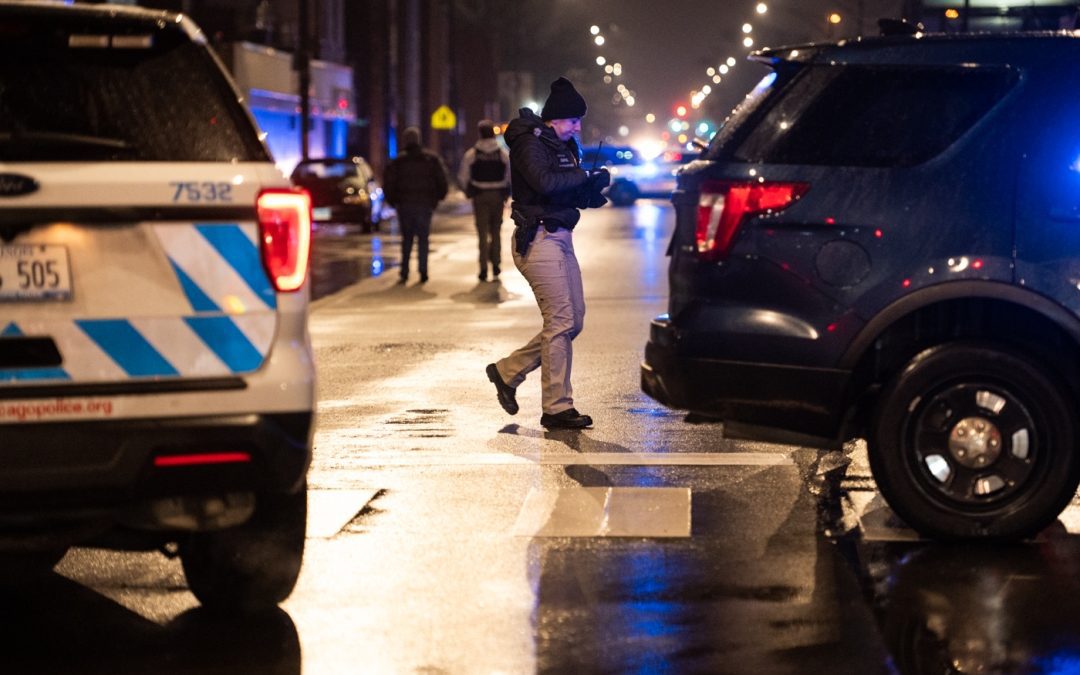CHICAGO — Fewer than one-quarter of Chicago residents feel the city is safe after almost two years of a pandemic and surging citywide crime, and fewer than one-third feel safe in their own neighborhoods, according to a .
The numbers represent a steep drop from even last fall, when 45 percent of survey respondents described the “feeling of safety” in their neighborhood as “excellent” or “good.” The most recent survey polled 703 Chicago residents and 128 Cook County suburbanites between Nov. 29 and Dec. 20 last year.
Nine percent of city-dwellers rated their own neighborhood’s safety as “excellent,” and another 24 percent called it “good.” Just 24 percent of respondents described the city overall as “somewhat safe” or “very safe,” with 30 percent calling it “somewhat unsafe” and 46 percent deeming Chicago “very unsafe.”
“The results are alarming,” said Michelle Kobayashi, senior vice president of innovation for Polco, the Colorado-based firm that conducted the poll. About 79 percent of respondents among the 333 towns and cities Polco has surveyed in the last five years typically rate their own neighborhoods highly for safety, Kobayashi said. Only one has posted lower numbers than Chicago — even as other large cities around the country have seen similar crime surges since 2020.
“We do see lower ratings [on safety] from larger cities,” Kobayashi said. “But it’s not very often that it ever goes below 50 percent.”
Chicago recorded 836 homicides in 2021, an uptick from the city’s historically violent 2020 and a number not seen in Chicago since 1994. The crime surge has set off a circle of finger-pointing among Mayor Lori Lightfoot, Chicago Police Department leaders and leaders of the Cook County court system.
Chicagoans’ public trust in every level of government took a hit during the course of last year, according to the Chicago Index. Just 9 percent of respondents in November and December said they felt the city was “heading in the right direction,” compared to 26 percent in the first quarter of 2021 and 21 percent in the third quarter.
The poll represents the fourth iteration of the quarterly Chicago Index poll, a collaboration between The Daily Line and Crain’s combining probability and non-probability sampling of Cook County residents. The results are weighted by age, race, gender, homeownership and area of residence within the city. The margin of error for the survey is 4 percent.
The first three Chicago Index polls last year showed dismal approval ratings for Lightfoot — a trend that only worsened in the most recent survey, when just 15 percent of respondents rated her leadership as “excellent” or “good.” The Chicago City Council’s approval rating took a similar dive, from 25 percent in the third-quarter survey to 17 percent last month.
Lightfoot ‘not surprised’ she and City Council scored poorly on inaugural Chicago Index survey
But Cook County Board President Toni Preckwinkle’s approval numbers took an even sharper dive, from 50 percent in the second quarter of 2021 to 41 percent in the third quarter and just 32 percent in the fourth quarter. And Gov. JB Pritzker skidded on a similar trajectory, with 67 percent of respondents rating him positively in September compared to 53 percent in November and December.
Preckwinkle and Pritzker both face reelection this year, with the mayoral election following close behind in February 2023.
Other “quality of life” metrics also nosedived in the most recent survey. Seventy-two percent of respondents said they feel less safe retail shopping in Chicago than they did in 2019. The same percentage said they felt less safe going out to movies or concerts, and 84 percent said they felt less safe riding public transportation than they did in 2019.
About 41 percent of respondents described Chicago as a whole as an “excellent” or “good” place to live, down from 54 percent in September. Ratings also fell across the board — albeit by smaller margins — when city residents were asked to rate their own neighborhood as a place to live, work and raise children.
When survey respondents feel unsafe, it’s common for their feelings to sour on a range of other issues close to home, Kobayashi said.
“We’ve asked people in thousands of cities what they think the most important thing is for the city to focus on, and the number-one or number-two thing is always safety,” she said. “It’s critically important — wanting to stay alive is at the core of being human. So if you feel like your safety is threatened, it really impacts the way you view your quality of life.”
Public perceptions of crime can also be heavily shaped by media coverage and by high-profile acts of crime reported in typically safe neighborhoods, Kobayashi added.
Spiking perceptions of crime as tracked by the Chicago Index did not correspond directly with trends in violent crime during the course of last year. The city recorded 193 homicides between July 1 and Aug. 31 compared to 114 killings between Nov. 1 and Dec. 31, reflecting a typical surge in crime during the summer months, according to city data.
Chicago Public Schools, the Department of Planning and Development and the Department of Public Health all saw their approval ratings take a hit between the third-quarter and fourth-quarter surveys.
The Chicago Police Department saw a rare uptick in ratings, with 43 percent of survey respondents saying they are “somewhat satisfied” or “very satisfied” with the department last month compared to 34 percent who said so in the fall. But at the same time, just 19 percent of city-dwelling respondents said they believe the police department is “somewhat” or “very” effective at preventing violent crime. Another 58 percent of Chicagoans surveyed said police are “not at all effective” at preventing violence.
Sign up here to answer questions for the Chicago Index in 2022.
Interested in more from The Daily Line? Sign up for The Daily Line’s Free Review.
This content was originally published here.

